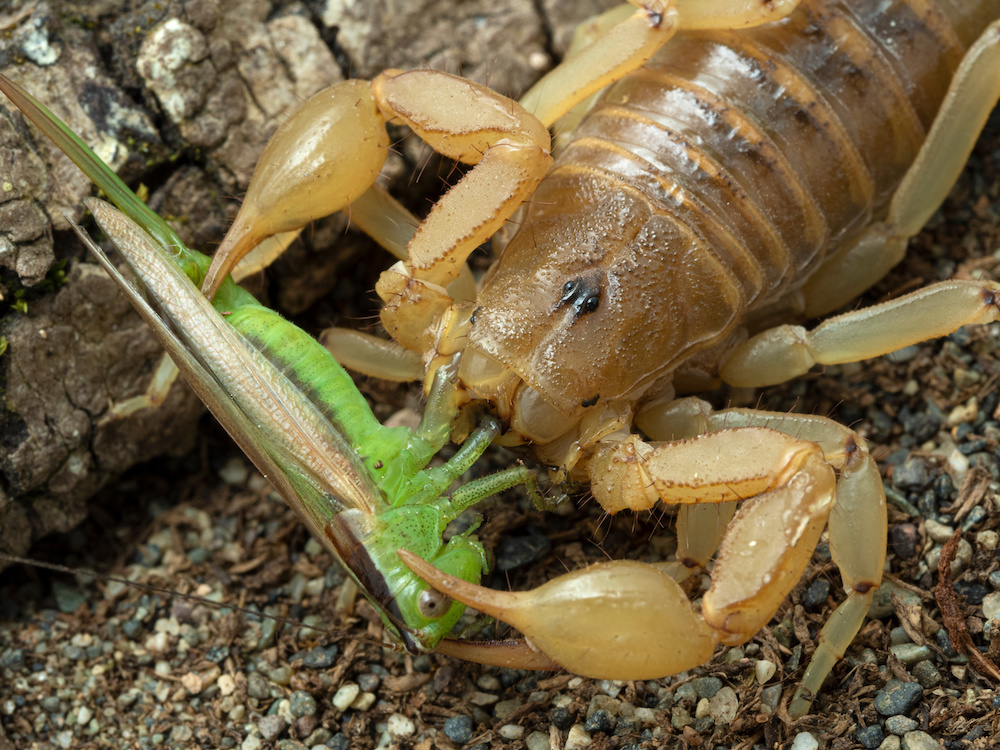When living in the heart of Arizona, particularly in areas like Chandler and its surroundings, encountering scorpions can be a common, albeit unsettling, experience. Understanding their dietary habits is not only interesting but also crucial for effective pest control.
So, what do scorpions eat, and how can this knowledge help you keep them at bay? Find out more with the team at Green Magic Pest Control!
What Do Scorpions Eat?
Scorpions are nocturnal hunters, emerging from their hiding spots at night to search for food. Their diet primarily consists of various insects and arachnids, making them both predators and prey in the delicate desert ecosystem.
Insects
Crickets, beetles, and grasshoppers are among scorpions’ favorite snacks. These insects are abundant in the desert environment, providing a reliable food source. Because of their abundance and size, insects offer nutritional value and are relatively easy for scorpions to capture.
Crickets, in particular, are a significant part of their diet. They are often found in the same environments as scorpions, including homes and gardens. Beetles, another common prey, provide a challenging but rewarding meal due to their hard exoskeleton and nutritious interior.
Though less commonly found in urban settings, grasshoppers are part of scorpions’ natural desert diet. These insects can migrate in large numbers, occasionally causing a temporary spike in the scorpion population if they become a readily available food source.
Arachnids
Scorpions also feed on spiders and other smaller arachnids as they often share similar habitats. A scorpion’s venom is highly effective in immobilizing spiders, making them an easy target despite their agility.
Common house spiders and other tiny arachnids in Chandler and surrounding areas can often fall prey to scorpions. This predation helps maintain the balance of the ecosystem; however, a spider infestation can also cause an uptick in scorpions.
Small Vertebrates
While less common, some larger scorpion species may prey on small vertebrates like lizards, mice, and other scorpions.
Lizards are a part of the desert ecosystem and can occasionally fall prey to scorpions. Though more challenging to catch, mice can also become scorpion prey, especially when food is scarce and scorpions need to diversify their diet. Cannibalism is not unheard of among scorpions, particularly when resources are limited.
Why Does a Scorpion’s Diet Matter?
Minimizing the number of insects and other small creatures around your property can make your environment less appealing to scorpions. Regular pest control treatments targeting common scorpion prey can significantly reduce scorpion activity.
For instance, controlling cricket and beetle populations can remove a significant portion of the scorpions’ food supply, making your home less attractive to them.
Maintaining a well-kept yard is also crucial in eliminating potential hiding spots and food sources for scorpions. Here are some tips:
- Trim Bushes and Trees: Regularly trim bushes and trees to prevent them from becoming overgrown, which can create hiding spots for scorpions.
- Remove Debris: Clear away piles of leaves, wood, and other debris where scorpions and their prey might hide.
- Avoid Overwatering: Excessive moisture can attract a variety of insects that scorpions prey on. Tailor your irrigation practices to the dry Chandler environment.
Knowing what attracts these pests can help you keep them at bay. Monitor the pest population around your home, and contact us at Green Magic Pest Control to eliminate any common Chandler pests!
Scorpion Control in Chandler, AZ
Living in Chandler means dealing with the unique challenges of the desert environment, including scorpions. Professional pest control services are vital in managing and preventing scorpion infestations. Here’s how we can help:
Inspection and Assessment
The first step in effective scorpion control is a thorough inspection of your property. Pest control professionals will identify potential scorpion hotspots and entry points, such as:
- Outdoor Structures: Scorpions often hide under rocks, logs, and piles of debris.
- Landscaping: Overgrown vegetation, woodpiles, and mulch beds can provide excellent hiding spots.
- Home Exteriors: Cracks in the foundation, gaps around windows and doors, and other small openings.
Targeted Treatments
After the inspection, our pest control professionals will develop a targeted treatment plan. Using a blacklight flashlight, we’ll chase down these pests and eliminate them quickly. The choice of treatment depends on the severity of the infestation and your property’s specific needs.
Preventative Measures
In addition to immediate treatments, long-term preventative measures are crucial:
- Regular Maintenance: Scheduling regular pest control treatments to maintain a protective barrier around your home.
- Environmental Modifications: You can make changes to your property to reduce scorpion habitats, like removing debris and properly draining spaces around your home.
- Education and Awareness: Understanding scorpion behavior and taking personal precautions to avoid accidental encounters.
- Outdoor Lighting: Use yellow or sodium vapor lights for outdoor lighting, as these are less attractive to insects and will reduce the food supply for scorpions.
- Remove Standing Water: Eliminate sources of standing water to avoid attracting insects.
- Store Firewood Away from Home: Keep firewood and other materials at least 20 feet away from your home and elevated off the ground.
And whenever you need help against an active infestation, just contact the experts here at Green Magic Pest Control!


